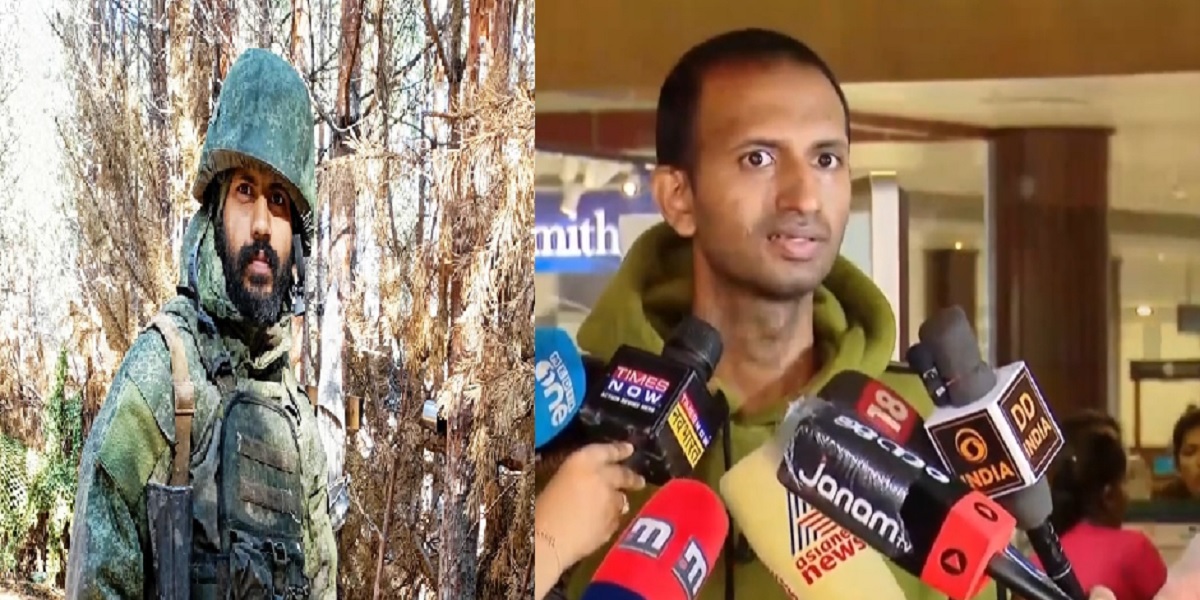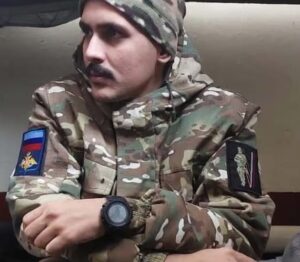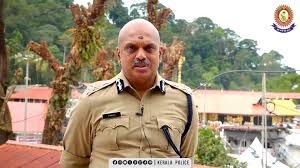Published May 04, 2025 | 9:00 AM ⚊ Updated May 24, 2025 | 7:33 PM

Binil Babu (Left) was killed in the war while Jain Kurian escaped with injuries.
Synopsis: Thrissur, Kerala-resident Jain Kurian’s story is about how recruitment agents lure Malayali youths by promising lucrative job opportunities abroad, and hand them over to Russia to fight alongside its army against Ukrainian troops.
Jain Kurian will never forget that Thursday in 2024, the day he arrived in Russia along with his cousin Binil Babu and a few others.
Back home, Kerala was preparing for Vishu, the Malayalam New Year, when Kurian and others set foot on Russia on 4 April 2024, en route to a promised life of prosperity and happiness.
Little did the men then know that a year of horror, tears, pain, blood, and death awaited them in Russia, the land which seemed to hold many promises for them. It was too late when realisation dawned on them that they had been scammed and pushed into a war that was not theirs.
Two years ago, on 24 February, Russia launched a military invasion of Ukraine, confident that the smaller country would succumb to its might within days. The Kremlin, however, was wrong. The Ukrainians put up a spirited resistance, leaving overconfident Russian Generals in shock and awe.
Even as an easy win remained elusive, Russia started drafting mercenaries and unwilling men, including foreigners, into its army. Kurian and Babu were among those men who had no desire to fight.
A fast receding hairline, shallow cheeks, and an aquiline nose are often considered signs of strength, elegance, and grit. These features do not necessarily make Kurian stand apart from others, but the scars on his stomach and limbs speak volumes that make him different.
Dates now have specific meanings for Kurian. On 23 April 2025, he landed in Delhi, and the next day walked into the gloomy relief of his home at Kuranchery in Kerala’s Thrissur district.
Celebrations did not mark the homecoming. Besides Kurian’s family members, a few people, including Wadakkanchery MLA Xavier Chittilappilly, welcomed him back. Despite having a sense of relief, the man was tense as a scar the war had left in his mind kept burning him.
Somewhere in Russia, his cousin Babu is still lying dead, the mortal remains awaiting to be flown back, and embraced by the depths of his home soil.
Several days have passed since Kurian’s return. Images of bygone days keep flashing in Kurian’s mind whenever — it has become frequent — he wakes up in cold sweat in the middle of the night.
The hum of drones, sound of scampering boots, shouts, and a boom — followed by a momentary deafening silence that keeps ringing in the ear, fading eyesight, screams, the acrid odour of burnt flesh and gun powder, and the piercing pain in the abdomen — all come back fresh and rushing to haunt his mind.
And then in Kurian’s bedroom, time stands still.
Through a window, he could see the darker but familiar silhouette of Babu’s house rising against the darkness of unearthly hours. It is one window he avoids during the day. He fears any eye contact or questions that may come through the window that opens to Babu’s house, a few metres away.
It was January, Kurian recalled. Babu was on the warfront when a shell launched by a drone targeted his group. After the initial commotion, Kurian turned over a body and stared at his cousin, battered, quiet and dead.
Babu had paid for someone else’s war — and greed — with his blood.
A day after Babu’s death, Kurian, too, came under attack. The pain was gradual but soon became excruciating, he recalled. Shrapnel had pierced Kurian’s body but spared his life. He was shifted to a hospital in Moscow, where he underwent multiple surgeries.
Post-medical treatment that spread over three months, the Indian Embassy and Malayali Association in Russia intervened to ensure his freedom.
Once back in Thrissur, he was taken to Amala Institute of Medical Sciences. ”They treated you well. They provided all the medications at the right time,” Kurian heard a few words that comforted him after months of uncertainty.
Kurian and Babu found nothing suspicious when a relative, said to be working in the army, promised them jobs.
“He told us that there were vacancies in the electrical and mechanical fields. Initially, he said he worked as an X-ray welder in Poland. I asked if he could take me along as an assistant,” Kurian recalled. The relative agreed.
The relative later told Kurian and Babu that he had joined the army. The credulous cousins still did not lose trust.
“He hid the fact that he was with the Russian army, and not the Polish army. I paid the amount he demanded, thinking I would get a visa to Poland,” Kurian said.
He realised that the visa was for Russia, and not Poland, only when it arrived.
Despite the red flags, Kurian said he took it up since he had no choice. The relative, who held a position in the army, reassured them. The cousins had, by then, availed of loans to cover agent commissions and visa processing charges. Both were desperate for jobs.
”I trusted him because he was my relative,” Kurian put it in the past tense.
Babu, too, believed that he would be working as a technician with the Polish army. On 4 April 2024, they both boarded a flight to Russia. On arrival, they realised that things were not as expected.
“We never met him (the relative) in person after reaching there. But he stayed in touch with us over the phone. We were taken directly to an army camp from the airport,” Kurian spoke about the beginning of the end of hope.
When objected, the relative pacified them. ”He told us we would just stay in the camp for two months to get an ID, and then we could begin the job. We believed that lie too,” the man said.
However, the cousins protested at the army camp. The men said that they had been misled and did not wish to serve in the army. No help came. ”The officers said they were helpless.”
For two months, in Tula and then in Voronezh, they underwent forced training on handling guns, grenades, smoke bombs, and basic medical aid.
”We trained daily from 10 am to 5 pm. We had to tread 3 km into the forest with heavy weapons. It was exhausting,” Kurian said about the two months of hell. He didn’t know then that the worst was yet to come.
”One morning, we thought we were going for the routine training. But the vehicle changed course. When asked, they said that we were being taken to the warfront at the Russia–Ukraine border. It came as a shock,” Kurian said.
Kurian’s voice broke frequently as he recounted the harrowing experience near the Russia-Ukraine border.
The cousins were part of a six-member team that also comprised two Russians assigned to deliver food to the frontline troops. They were tasked with carrying supplies from a basecamp to various outposts, each journey covering four to six kilometers one way.
”Shells and drones kept flying above us. We walked under constant threat,” he recalled.
Their work demanded routine treks through war-scarred landscapes. After three months, the team was redeployed to a different location, where they had to crawl and move slowly, and hide in bunkers to avoid drone surveillance and shelling.
On 5 January, another group took Babu. ”We couldn’t go together. It was too risky,” Kurian explained.
The next morning, 6 January, Kurian braved heavy bombardment and inched forward. He navigated trenches and bunkers where lifeless men in army fatigues lay scattered, some Syrian, Egyptian, Uzbek, and many others.
”I saw a body. Something made me run toward it. When I turned it over, it was my cousin, Binil Chettan (elder brother),” Kurian said. Jain reported the casualty to a commander, but in the chaos of war, it meant little.
For the Russians, Babu was just another dead foreigner.
On 7 January, a shell exploded near Kurian, ripping his abdomen. Severely wounded, he was moved to a hospital in Moscow, where he remained from 8 January to 22 April, undergoing multiple surgeries.
Even before he had fully recovered, Kurian received orders to report back to his army unit.
”They were planning to send me back to the battlefield,” he said.
The doctor attending to him told him a cold truth: though his service contract had expired, the military might extend it without his permission.
With support from the Indian Embassy and the Malayali Association in Russia, Jain managed to obtain an emergency certificate and a flight ticket. Instead of returning to the military base, he proceeded to the airport in Moscow.
”It was a desperate risk, but I had no other way out. Going back to the camp would’ve meant being pushed right into combat again. And I knew exactly what it could lead to. I could end up like my cousin,” Kurian was determined to escape.
A pause later, he mumbled: ”The image of Binil Chettan is etched in my mind. It will haunt me forever.”
Salary was the last thing on Kurian’s mind during his days in the Russian army. ”After I had lost my passport and other documents, I don’t know if they paid me or not. I never even thought about it. Escaping from the warfront was my priority.”
He acknowledged the limitations faced by the Indian Embassy. ”They could only forward requests to the Russian Defence Ministry, which were then passed onto commanders and army chiefs. But a response is not guaranteed. Embassy officials visited me several times in the hospital, and their intervention helped me get out.”
Kurian did not sound positive when asked about the chances of bringing Babu’s body home. “The embassy can’t do anything unless the army shifts the body to Moscow. Otherwise, who can go to the warfront to collect a body? It’s impossible,” he told South First.
The recruitment agent, Jain’s relative, continued operating from another location. He went on to enlist more individuals from Kerala, two from Thrissur, one from Ernakulam, and another from Kollam.

Sibi PO (25), Kurian’s relative, has been arrested.
All four were misled by false promises and ended up in the Russian army. The agent lured them by saying his relatives, too, were employed there.
One of the recruits, a young man from Puthukkad in Thrissur, too, was killed in a shell attack. The remaining three were brought back to Kerala through the intervention of the Indian Embassy.
According to their statements, they were promised lucrative job opportunities. Initially assigned to tasks like delivering food and constructing trenches along the Russia-occupied Ukraine front, they were later deployed for direct combat.
On 19 January 2025, Kerala police arrested Kurian’s relative, Sibi PO (25), from Thrissur. This was a week after the arrests of two others—Sandeep Thomas (40) from Ernakulam and Sumesh Antony (40) from Thrissur—by the Wadakkanchery police.
In response to alarming reports of Malayalis being trafficked to join the Russian army, the state police formed a Special Investigation Team (SIT) under ADGP S Sreejith.

S Sreejith, IPS, is leading the SIT.
The SIT will probe allegations that individuals from the state were deceived with lucrative job offers and instead pushed into military roles amid the ongoing Russia-Ukraine conflict.
When South First reached out to a member of the SIT, the officer revealed that the suspects had enticed youths with promises of high-paying employment in Russia but ultimately dumped them in military service.
The accused have been booked under multiple charges, including those related to human trafficking, cheating, and violations of the Emigration Act.
Superintendent of Police (Thrissur Rural) B Krishnakumar said that the arrests were made after extensive interrogations, and the police were watching fraudulent recruitment agents.
Kurian’s story is one among many in a growing pattern of illegal recruitment to the Russian military, where young men are duped by the allure of better pay and job prospects, but end up in a warzone.
(Edited by Majnu Babu).

